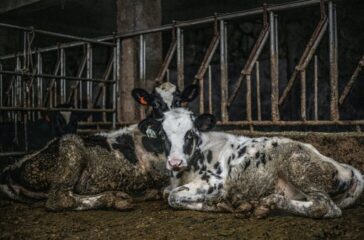US efforts to turn farm animal poop into biofuel spark scrutiny
By Shannon Kelleher
Industrial-sized livestock operations have long been known for contaminating the environment and mistreating animals. Now, amid growing government incentives to turn the manure generated at these operations into climate-friendly biofuels, there are mounting concerns that the efforts could make industrial farming bigger and more dangerous.
Critics say government support for the production of biogas through the use of what are known as manure digesters comes with an array of well-documented risks. The digesters break down manure and capture methane gas, which can be used as fuel, but they come with a history of fires, explosions, hydrogen sulfide poisoning, methane leaks, and even drowning.
Methane digesters “exacerbate the dangers that are already endemic to industrial animal farming… where animals are housed in the same location as malfunctioning equipment, flammable liquids, and dangerous manure management practices,” said Alicia Prygoski, strategic legislative affairs manager at the Animal Legal Defense Fund (ALDF) animal advocacy group.
“Encouraging mass amounts of manure production, to facilitate the mass capture of the flammable gas that results from its decomposition, is what creates the increase in risks for explosions,” said Prygoski. “All you need is a spark.”
The Biden Administration’s much-touted Inflation Reduction Act includes funding and tax credits incentivizing farmers to install more of these digesters, and the new Farm Bill could include funds incentivizing the practice.
The ALDF and more than 100 other organizations sent a letter in December to US Agriculture Secretary Tom Vilsack calling on the agency to stop any allocation of additional funding from the IRA for the use or expansion of methane digesters or “production of factory farm gas.”
The groups cited a “ballooning factory farm gas industry,” and warned, among other issues, that digesters can “leak methane and manure and can even explode.”
 EWG
EWG